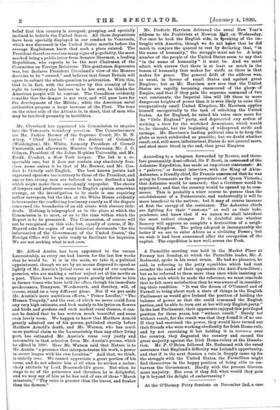Mr. Alfred Austin has been appointed to the vacant Laureateship,
as every one had known for the last few weeks that he would be. It is in the main, we take it, a political appointment, though we are by no means disposed to speak so lightly of Mr. Austin's lyrical verse as many of our contem- poraries, who are making a rather unjust set at his merits as a poet. There have been many poets greatly inferior to him in former times who have held the office, though his immediate predecessors, Tennyson, Wordsworth, and Southey, will, of course, stand on a very different plane. But if we put aside Mr. Austin's more ambitious efforts, "Prince Lucifer," "The Human Tragedy," and the rest, of which we never could form any very high estimate, and look mainly to his lyrics on flowers and birds and gardens and such modest rural themes, it can- not be denied that he has written much beautiful and some even lovely verse. We happen to know that Matthew Arnold greatly admired one of his poems, published shortly before Matthew Arnold's death, and Mr. Watson, who has much more poetical claim to the Laureateship than any other living poet, has estimated Mr. Austin's verse very justly and favourably in that selection from Mr. Austin's poems, which he edited in 1890. Here Mr. Watson said that Nature is to Mr. Austin "a presence that interpenetrates his work, a power in secret league with his own faculties." And that, we think, is strictly true. We cannot appreciate a great portion of his verse, and do not admire him at all when he strikes a melan- choly attitude by Lord Beaconsfield's grave. But when he sings to us of the primroses and thrushes, he is delightful, and we may say of him as he has said of one of these "March minstrels," "Thy voice is greener than the leaves, and fresher than the flowers."














































 Previous page
Previous page